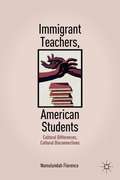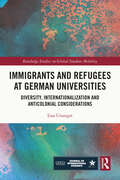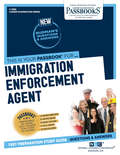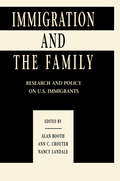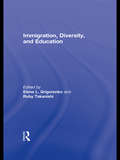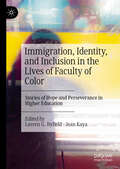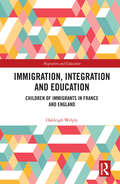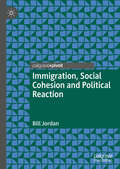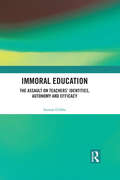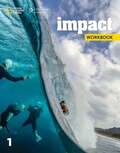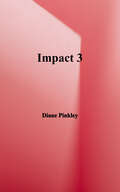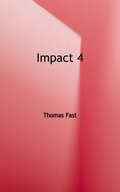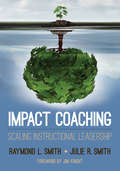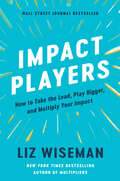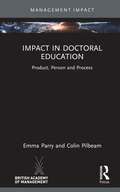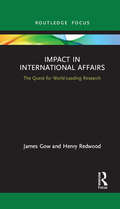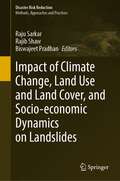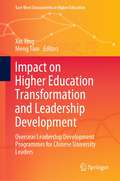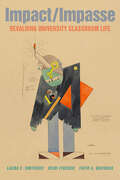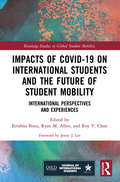- Table View
- List View
Immigrant Teachers, American Students
by Namulundah FlorenceTeachers, as often as students, articulate frustrations over each other's choices and expectations. A teacher's demand for respect may appear an imposition and abuse of authority to students accustomed to speaking out against perceived injustices. All teachers experience some tentativeness, especially in an unfamiliar environment. Since classroom decisions tend to be immediate, choices reflect learned attitudes and behaviors as much as logical decision-making procedures. Florence explores the cross-cultural complexities of teacher/student interactions, particularly African immigrant teachers. Despite the emotional aggravations, cultural misunderstandings offer forums for a reassessment of views, acknowledgement of differences, and initiative for positive change.
Immigrants and Refugees at German Universities: Diversity, Internationalization and Anticolonial Considerations (Routledge Studies in Global Student Mobility)
by Lisa UnangstThis book takes a critical and historical perspective in parsing the current state of play for refugee and immigrant students in Germany, addressing federal, state, and institutional innovations as well as gaps in service.Drawing from de/post/anticolonial theory, it considers the levels of support for diverse groups including migrants, refugees, and racialized Germans, investigating why a comparatively well-resourced higher education system has, to date, selectively invested in the support of some marginalized groups. It calls for the reconsideration of policy and programmatic support, drawing from emerging best practice across states and higher education institutions (HEIs). Using historical analysis, federal and state level policy documents, institutional equal opportunity plans and student-facing websites, reporting, and first-person-accounts of marginalized students both prospective and enrolled, this critically oriented work interrogates how and why the world’s fourth largest economy – and its primarily public higher education system – have failed to engage systemic change with an eye towards addressing mechanisms of exclusion including racialization and xenophobia. It concludes with a consideration of possible policy interventions supporting these minoritized student groups who are essential not only to German learning and economy, but also to the rebuilding of conflict states.This volume will appeal to researchers, scholars, and practitioners working across comparative and international higher education, crisis education, and education in emergencies, as well as diversity specialists.
Immigration Enforcement Agent: Passbooks Study Guide (Career Examination Series)
by National Learning CorporationThe Immigration Enforcement Agent Passbook® prepares you for your test by allowing you to take practice exams in the subjects you need to study. It provides hundreds of questions and answers in the areas that will likely be covered on your upcoming exam, including but not limited to: arithmetical reasoning; understanding and interpreting data in graphs, charts and tables; understanding and interpreting written material; word meaning; evaluating conclusions in light of known facts; reading comprehension; and other related areas.
Immigration and the Challenge of Education
by Nathalia E. JaramilloAnalyzes a community from the standpoint of immigrant mothers in South Central Los Angeles who were concerned about the education of their children and the violence in their communities. Written in Spanish and English, the text brings together the women's observations as they put into action their developing political consciousness.
Immigration and the Family: Research and Policy on U.s. Immigrants (Penn State University Family Issues Symposia Series)
by Alan Booth Ann C. Crouter Nancy LandaleThis book documents the third in a series of annual symposia on family issues--the National Symposium on International Migration and Family Change: The Experience of U.S. Immigrants--held at Pennsylvania State University. Although most existing literature on migration focuses solely on the origin, numbers, and economic success of migrants, this book examines how migration affects family relations and child development. By exploring the experiences of immigrant families, particularly as they relate to assimilation and adaptation processes, the text provides information that is central to a better understanding of the migrant experience and its affect on family outcomes. Policymakers and academics alike will take interest in the questions this book addresses: * Does the fact that migrant offspring get involved in U.S. culture more quickly than their parents jeopardize the parents' effectiveness in preventing the development of antisocial behavior? * How does the change in culture and language affect the cognitive development of children and youth? * Does exposure to patterns of family organizations, so prevalent in the United States (cohabitation, divorce, nonmarital childbearing), decrease the stability of immigrant families? * Does the poverty facing many immigrant families lead to harsher and less supportive child-rearing practices? * What familial and extra-familial conditions promote "resilience" in immigrant parents and their children? * Does discrimination, coupled with the need for rapid adaption, create stress that erodes marital quality and the parent-child bond in immigrant families? * What policies enhance or impede immigrant family links to U.S. institutions?
Immigration, Diversity, and Education
by Elena L. Grigorenko Ruby TakanishiThis edited volume presents an overview of research and policy issues pertaining to children from birth to 10 who are first- and second-generation immigrants to the U.S., as well as native-born children of immigrants. The contributors offer interdisciplinary perspectives on recent developments and research findings on children of immigrants. By accessibly presenting research findings and policy considerations in the field, this collection lays the foundation for changes in child and youth policies associated with the shifting ethnic, cultural, and linguistic profile of the U.S. population.
Immigration, Identity, and Inclusion in the Lives of Faculty of Color: Stories of Hope and Perseverance in Higher Education
by Lavern G. Byfield Jean KayaThis book draws from social, psychosocial, and psychological perspectives to highlight the fatigue experienced by immigrant faculty of color in institutions of higher learning. In addition to a brief history of migration to the United States of America and a synopsis of the historical contexts of race relations, contributors share autoethnographic narratives of resistance and hope, as well as findings from qualitative and mixed-methods studies showcasing the inner voices, resilience, determination, and courage of immigrant faculty of color. The book illuminates multiple aspects which shape the identities and experiences of immigrant faculty of color as they navigate the academy. This book is a resource for faculty, administrators, and international doctoral students of color who aspire to become faculty in higher education.
Immigration, Integration and Education: Children of Immigrants in France and England (Migration and Education)
by Oakleigh WelplyImmigration, Integration and Education offers a unique comparative analysis of the views and experiences of children of immigrants in school in France and England. It showcases how the theorization of children’s narratives can offer new methodological tools and insights in comparative education and help understand the different role of educational systems and discourses around issues of immigration, integration, race, language and religion. Presenting an in-depth analysis of children’s own narratives, this book offers a close comparative examination of the French and English educational systems, and the ways in which they impact on the experiences and identities of children of immigrants. The narratives of the children reveal the multiple forms of othering, discrimination and exclusion that shape their experiences in school, but also the multiple strategies they deploy to navigate these complex educational landscapes. It stresses that beyond national ideologies and philosophies of integration, structural and cultural aspects need to be explored to understand the role played by schools in the inclusion of immigrant populations. This book is an essential resource for academics, researchers and graduate students in the fields of sociology of education, migration studies, intercultural education, educational policy and comparative and international education. It will also appeal to those who are committed to addressing inequalities and discrimination in education.
Immigration, Social Cohesion and Political Reaction
by Bill JordanThis book addresses the challenge for social integration posed by immigration into Western liberal democracies. Movement of people, goods and money across borders has increased in recent decades – the phenomenon known as globalisation. But it has been the migration of refugees from civil wars in the Middle East which has most transformed the political life of European societies, causing the decline in support for the traditional conservative and social democratic parties. It has triggered nationalistic mobilisations and authoritarian regimes, as well as attempts to improved integration in societies. The coronavirus pandemic has added a dimension to these processes, but also opened up new possibilities for transformation.
Immoral Education: The Assault on Teachers’ Identities, Autonomy and Efficacy
by Simon GibbsThis book brings together for the first time a synthesis of philosophical and psychological material to examine the basis for the professional identity that teachers might believe in, and the effects of misunderstanding and mistreating these beliefs. By critically synthesising findings from a range of sources, the book provides a rationale that argues an essential ingredient of good education is the quality of teachers who have a reaffirmed sense of creativity, autonomy and agency. The book presents a role for educational psychology in informing educational and inclusive processes, filling a longstanding need for a text that delineates the way psychological phenomena underpin education. Beginning by considering notions of ‘self’ and ‘identity’, the book explores the relationship between our identity as defined by ourselves, but also as defined by others in the social and professional groups we may or may not be considered as being part of. It looks critically at how the erosion of the professional identity of teachers has affected education, and considers the morality of ‘othering’ ‘others’ and its damaging effect on teachers and young people. Gibbs reflects on the organisational structure and leadership of schools, the psychology of these institutions, and the barriers that need to be overcome in order to promote greater inclusivity within them. Offering a careful and insightful look at the psychology behind education and teaching, this is an essential read for teacher educators, researchers and academics in the field of education and will appeal to policy makers, teachers and educational psychologists.
Immortality: Immortality
by Loraine BoettnerIn this concise, comprehensive, and hope-filled study of death and immortality, which was first published in 1956, author Loraine Boettner addresses a wide range of existential questions, including what happens at death, prayers for the dead, burial versus cremation, soul sleep, annihilation, purgatory, and eternal life.“...an enriching, wholesome and comforting book.”—The Evangelical Christian“It is doubtful if any monograph on this subject has ever been published that treats it in a more convincing and challenging manner.”—The Southern Presbyterian Journal“...well written, carefully documented, Scripturally sound, logically presented, and most helpful.”—Sunday School Board, Southern Baptist Convention
Immunitas: The Protection And Negation Of Life
by Roberto EspositoThis book by Roberto Esposito - a leading Italian political philosopher - is a highly original exploration of the relationship between human bodies and societies. The original function of law, even before it was codified, was to preserve peaceful cohabitation between people who were exposed to the risk of destructive conflict. Just as the human body's immune system protects the organism from deadly incursions by viruses and other threats, law also ensures the survival of the community in a life-threatening situation. It protects and prolongs life. But the function of law as a form of immunization points to a more disturbing consideration. Like the individual body, the collective body can be immunized from the perceived danger only by allowing a little of what threatens it to enter its protective boundaries. This means that in order to escape the clutches of death, life is forced to incorporate within itself the lethal principle. Starting from this reflection on the nature of immunization, Esposito offers a wide-ranging analysis of contemporary biopolitics. Never more than at present has the demand for immunization come to characterize all aspects of our existence. The more we feel at risk of being infiltrated and infected by foreign elements, the more the life of the individual and society closes off within its protective boundaries, forcing us to choose between a self-destructive outcome and a more radical alternative based on a new conception of community.
Impact 3
by Diane PinkleyThis book helps teenage learners to better understand themselves, each other, and the world they live in. By encouraging self-expression, global citizenship, and active participation, the book motivates students to explore who they are and who they want to be, all while learning English!
Impact 4
by Thomas FastImpact helps teenage learners to better understand themselves, each other, and the world they live in. By encouraging self-expression, global citizenship, and active participation, Impact motivates students to explore who they are and who they want to be, all while learning English!
Impact Coaching: Scaling Instructional Leadership
by Raymond L. Smith Julie Rae SmithInvest in building talent. The best principals don’t just happen. When new principals are handed the keys and left to make decisions about their schools without adequate, sustained support, what happens? Too often, school improvement efforts don’t gain full traction, principals often give up and leave and real student gains remain out-of-reach. Impact Coaching bucks the notion of leaving principals to learn the ropes on their own. This book offers a solid, sustainable, and laser-sharp focus on instructional leadership and helps leaders hone, model and lead new learning through deliberate practice by: Engaging in rich, rigorous, and reflective open-to-learning conversations with both coaches and colleagues to improve instructional leadership practices Leveraging their 5 Big Winner Practices for highest impact Using Linking Walk templates to apply new ideas to real scenarios that improve lead learner practices This book could be your single most impactful investment toward eventual student achievement. "The authors do a great job of sharing the benefits of coaching and elaborating on how the coaching partnership should and could look. The book is very relevant, clearly based on research, and has some great checklists to further clarify the recommended steps." –Kathy Rhodes, Principal Hinton Elementary, Hinton, IA "Impact Coaching provides school leaders with the tools to turn opportunity into action. Educational leaders possess an incredible capacity to influence the system and impact student learning. Ray and Julie Smith present strategies for focusing on leadership practices that maximize impact on student learning and achievement. This book will re-ignite your commitment to creating effective change, bolster your confidence to persist through challenges, and renew your motivation to reach your fullest potential. The authors will simultaneously inspire your soul and challenge your mind!" –Russell J. Quaglia, President/Founder Quaglia Institute for Student Aspirations
Impact Coaching: Scaling Instructional Leadership
by Raymond L. Smith Julie Rae SmithInvest in building talent. The best principals don’t just happen. When new principals are handed the keys and left to make decisions about their schools without adequate, sustained support, what happens? Too often, school improvement efforts don’t gain full traction, principals often give up and leave and real student gains remain out-of-reach. Impact Coaching bucks the notion of leaving principals to learn the ropes on their own. This book offers a solid, sustainable, and laser-sharp focus on instructional leadership and helps leaders hone, model and lead new learning through deliberate practice by: Engaging in rich, rigorous, and reflective open-to-learning conversations with both coaches and colleagues to improve instructional leadership practices Leveraging their 5 Big Winner Practices for highest impact Using Linking Walk templates to apply new ideas to real scenarios that improve lead learner practices This book could be your single most impactful investment toward eventual student achievement. "The authors do a great job of sharing the benefits of coaching and elaborating on how the coaching partnership should and could look. The book is very relevant, clearly based on research, and has some great checklists to further clarify the recommended steps." –Kathy Rhodes, Principal Hinton Elementary, Hinton, IA "Impact Coaching provides school leaders with the tools to turn opportunity into action. Educational leaders possess an incredible capacity to influence the system and impact student learning. Ray and Julie Smith present strategies for focusing on leadership practices that maximize impact on student learning and achievement. This book will re-ignite your commitment to creating effective change, bolster your confidence to persist through challenges, and renew your motivation to reach your fullest potential. The authors will simultaneously inspire your soul and challenge your mind!" –Russell J. Quaglia, President/Founder Quaglia Institute for Student Aspirations
Impact Players: How to Take the Lead, Play Bigger, and Multiply Your Impact
by Liz WisemanWhy do some people break through and make an impact while others get stuck going through the motions?In every organization there are Impact Players—those indispensable colleagues who can be counted on in critical situations and who consistently receive high-profile assignments and new opportunities. Whether they are on center stage or behind the scenes, managers know who these top players are, understand their worth, and want more of them on their team. While their impact is obvious, it’s not always clear what actually makes these professionals different from their peers.In Impact Players, New York Times bestselling author and researcher Liz Wiseman reveals the secrets of these stellar professionals who play the game at a higher level. Drawing on insights from leaders at top companies, Wiseman explains what the most influential players are doing differently, how small and seemingly insignificant differences in how we think and act can make an enormous impact, and why—with a little coaching—this mindset is available to everyone who wants to contribute at their highest level. Based on a study of 170 top contributors, Wiseman identifies the mindsets that prevent otherwise smart, capable people from contributing to their full potential and the five practices that differentiate Impact Players:While others do their job, Impact Players figure out the real job to be done. While others wait for direction, Impact Players step up and lead.While others escalate problems, Impact Players move things across the finish line.While others attempt to minimize change, Impact Players are learning and adapting to change. While others add to the load, the Impact Players make heavy demands feel lighter.Wiseman makes clear that these practices—and the right mindset—can help any employee contribute at their fullest and shows leaders how they can raise the level of play for everyone on the team. Impact Players is your playbook for the new workplace.
Impact in Doctoral Education: Product, Person and Process (Management Impact)
by Emma Parry Colin PilbeamDemonstrating how impact can be created and derived from doctoral programmes, this book focuses on their influence on academic knowledge, policy and practice. Significantly, it highlights the crucial impact of these programmes on the individual and the enduring consequences of this.Drawing on their extensive experience and conversations with stakeholders in doctoral education from around the world, and incorporating real case examples, the authors provide practical guidance throughout the book which enables readers to enhance the design of new and existing doctoral programmes for greater impact. Each chapter ends with questions to stimulate reflection on the readers’ experience of impact from doctoral education. The concluding chapter outlines a manifesto for enhancing and ensuring impact from doctoral research in the future.With insights into the impact of doctoral programmes on individual researchers, this book will be essential reading for scholars of management education, as well as being a valuable resource for Higher Education administrators and senior academics around the world tasked with increasing impact from their doctoral programmes.
Impact in International Affairs: The Quest for World-Leading Research (Contemporary Security Studies)
by James Gow Henry RedwoodThis book examines how and to what extent academic research in politics and international studies has had 'impact' — in doing so, it also considers what might characterise ‘world-leading’ research impact. International Relations was always meant to have impact – it was intended to make a difference in the world, when the subject was formally founded to understand and prevent war in 1919. This volume addresses the concept of ‘impact’ and offers a typology of the term — instrumental, conceptual, capacity building and procedural. The authors examine 111 impact case studies in the UK Research Excellence Framework (2014) that were classified as having achieved the highest level of evaluation, and they identify eight characteristics that mark ‘world-leading’ impact. The book concludes that process and public and media engagement are previously underestimated aspects of impact in official approaches. It further demonstrates that achieving the top levels of impact in international relations is possible, but that factors such as the nature of the subject, the approach of researchers and mean-spiritedness in the peer review process inhibited this. This book will be of much interest to students of politics and international studies, as well as educational research and policy makers, and anyone interested in, or working on, research impact.
Impact of Climate Change, Land Use and Land Cover, and Socio-economic Dynamics on Landslides (Disaster Risk Reduction)
by Rajib Shaw Biswajeet Pradhan Raju SarkarThis book discusses the impact of climate change, land use and land cover, and socio-economic dynamics on landslides in Asian countries. Scholars recently have brought about a shift in their focus regarding triggering factors for landslides, from rainfall or earthquake to claiming rapid urbanization, extreme population pressure, improper land use planning, illegal hill cutting for settlements and indiscriminate deforestation. This suggests that the occurrence or probabilities of landslides are shaped by both climate-related and non-climate-related anthropogenic factors. Among these issues, land use and land cover change or improper land use planning is one of the key factors. Further climate change shapes the rainfall pattern and intensity in different parts of the world, and consequently rainfall-triggered landslides have increased. These changes cause socio-economic changes. Conversely, socio-economic and lifestyle changes enhance inappropriate land use and climate change. All these changes in land use, climate and socio-economic aspects are dynamics in nature and shape landslide risks in Asian countries, where they are given serious attention by governments, disaster management professionals, researchers and academicians.This book comprises 21 chapters divided into three major sections highlighting the effect of climate change on landslide incidence with the influence on vegetation and socio-economic aspects. The sections address how climate change and extreme events have triggered landslides. The advances in geospatial techniques with the focus on land use and land cover change along with the effect on socio-economic aspects are also explored.
Impact of perceived organizational inclusion of differently abled employees
by Georgia Mickaela G. Aguila Joseph C. Cirineo Kriselle Armi S. Umingan.An abstract of the study entitled "Impact of perceived organizational inclusion on job satisfaction and individual work performance of differently abled employees".
Impact on Higher Education Transformation and Leadership Development: Overseas Leadership Development Programmes for Chinese University Leaders (East-West Crosscurrents in Higher Education)
by Xin Xing Meng TianThis book studies impact of “Overseas Leadership Development Programmes for Chinese University Leaders in the Central and Western Regions of China,” a research project funded by National Office for Education Sciences Planning (No. CIA170270), China. It is intended to enhance university leaders’ professionalism and to achieve impact on both the individual and institutional levels. The empirical data was collected using a mixed-methods approach including policy documents, learning diaries, a quantitative survey, and individual interviews. From the standpoint of transnational education, the book scrutinizes the context of the Chinese higher education governance system, the provision of overseas leadership development programmes, the needs of Chinese university leaders, the leadership development impact on the university leaders’ personal views regarding leadership, and its impact on institutional development and change. The book also addresses the challenges faced by these leaders when implementing the changes after their leadership development sections, explaining how these leadership development sections met or failed to meet the national goals of promoting innovation and social justice in university leaders’ work.The findings presented here will greatly enrich readers’ knowledge concerning Chinese university leaders’ professionalism and professional development. Further, the respective chapters provide evidence-based recommendations for educational practitioners, policymakers, overseas trainers, and researchers who are interested in developing university leaders’ professionalism through targeted leadership development, making the book a valuable resource for leadership development, policymaking, and further educational research.
Impact/Impasse: Revaluing University Classroom Life
by Laura E. Smithers Heidi Fischer Faith A. WatrousImpact/Impasse argues for the value of everyday life in college classrooms. Quantifiable categories such as high-impact practice, student engagement, and integrative learning have captured the imagination of a generation of higher education researchers, practitioners, administrators, and policymakers. But they miss those mundane moments, or "impasses," that resist capture by metrics while nevertheless shaping student outcomes. Impact/Impasse blends critical theories and ethnographic research—conducted before and during the COVID-19 pandemic—to argue that learning happens in ordinary moments. Indeed, in sharing anecdotes from both in-person and virtual classrooms, the coauthors show how the so-called new normal is little different from the old in its neoliberal attachment to data. Impact/Impasse provides a conceptual and practical foundation for an alternative approach to valuing impacts on their own terms, in excess of quantification.
Impacts of COVID-19 on International Students and the Future of Student Mobility: International Perspectives and Experiences (Routledge Studies in Global Student Mobility)
by Krishna Bista Roy Y. Chan Ryan M. AllenThis volume uses case studies and students' lived experiences to document the impacts of coronavirus (COVID-19) on international students and explore future challenges and opportunities for student mobility within higher education. Responding to the growing need for new insights and perspectives to improve higher education policy and practice in the era of COVID-19, this text analyses the changing roles and responsibilities of institutions and international education leaders post-2020. Initial chapters highlight key issues for students that have arisen as a result of the global health crisis such as learning, well-being, and the changed emotional, legal, and financial implications of study abroad. Subsequent chapters confront potential longer-term implications of students’ experiences during COVID-19, and provide critical reflection on internationalization and the opportunities that COVID-19 has presented for tertiary education systems around the world to learn from one another. This timely volume will benefit researchers, academics, and educators with an interest in online teaching and e-learning, curriculum design, and more specifically those involved with international and comparative education. Those involved with educational policy and practice, specifically related to pandemic education, will also benefit from this volume.
